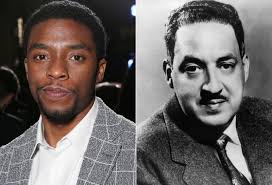
Deadline.com reports that Hudlin will direct and Boseman will star in Marshall, a legal thriller exploring an early case in Thurgood Marshall’s career. The story revolves around Marshall’s dispatchment by the NAACP to Connecticut at the beginning of World War II. He teams with a young, inexperienced Jewish lawyer named Samuel Friedman to defend a Black chauffeur in a sexual assault and attempted murder case against his white, wealthy socialite employer.
“Thurgood Marshall was a man who took his life in his hands every time he came to a town to bring justice,” Hudlin said in a press release. “Marshall was a cowboy who used his law books as guns. He was the smartest guy in the room of any room he was in. But he wasn’t a punk and didn’t hesitate to throw a punch if the occasion called for it.”
The immense torrent of historic landmarks in Thurgood Marshall’s life threatens to overrun the riverbanks of any film or television project. His first major victory in front of the Supreme Court came in 1940 with Chambers v. Florida. This case overturned the convictions of four Black men coerced into confessing to murdering a white man due to police brutality. Notably, he was also the architect behind Brown v. The Board of Education in 1954, striking down “separate but equal” and outlawing public school segregation. In 1967, he was appointed by President Lyndon B. Johnson as the first African-American Supreme Court Justice.
The best biopics have a narrow focus. By choosing to focus on an early case as part of his origin story, Hudlin and Boseman can say more about Thurgood Marshall as a man. Marshall can also be a more compelling film and focus on the very real danger he encountered throughout his career. His pinnacle accolades were built one case at a time, and Marshall looks to zero in on the creation of the most important legal mind of the 20th century.


